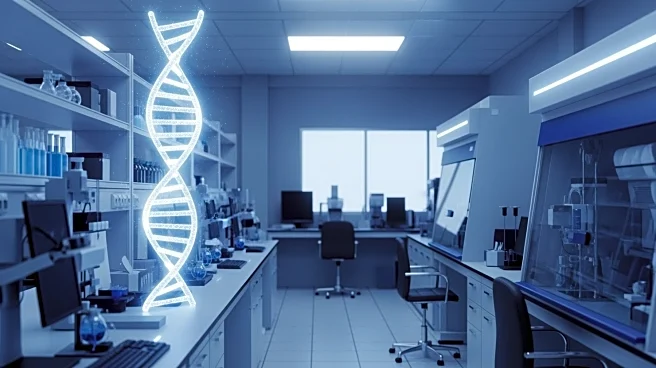What's Happening?
Washington University in St. Louis (WashU) is making significant strides in medical research and innovation, investing approximately $1.2 billion annually to advance clinical outcomes. The university conducts
around 2,500 clinical trials each year, leveraging the expertise of 14,500 physicians across its healthcare system. This collaborative approach involves professionals from various disciplines, including scientists, engineers, business experts, clinicians, and physician scientists, all working together to drive innovation. Notable achievements include the development of new blood tests for Alzheimer's disease by C2N Diagnostics and the use of AI for early breast cancer detection by Prognosia. WashU's commitment to tackling complex medical challenges, particularly in brain health and neurodegeneration, is a testament to its leadership in medical breakthroughs.
Why It's Important?
WashU's substantial investment in medical research has far-reaching implications for the healthcare industry and society at large. By fostering collaboration among diverse experts, the university is able to accelerate the development of innovative medical solutions that can improve patient care and outcomes. The advancements in Alzheimer's diagnostics and cancer detection exemplify the potential for these innovations to transform healthcare practices and enhance the quality of life for patients. Furthermore, WashU's efforts contribute to the broader St. Louis ecosystem, driving economic growth and establishing the region as a hub for medical research and innovation. The university's focus on addressing challenging medical issues underscores its role as a leader in the field, potentially influencing public policy and healthcare standards.
What's Next?
WashU is expected to continue its collaborative approach to medical research, with ongoing clinical trials and projects aimed at addressing critical health issues. The university's commitment to innovation may lead to further breakthroughs in diagnostics and treatment, particularly in areas like neurodegeneration. As WashU expands its research initiatives, it may attract additional funding and partnerships, enhancing its capacity to tackle complex medical challenges. Stakeholders, including healthcare providers, policymakers, and patients, will likely monitor these developments closely, anticipating new solutions that could reshape healthcare delivery and improve patient outcomes.
Beyond the Headlines
The collaborative model employed by WashU highlights the importance of interdisciplinary approaches in solving complex medical problems. By bringing together experts from various fields, the university fosters a culture of innovation that transcends traditional boundaries. This approach not only accelerates the pace of discovery but also encourages the integration of diverse perspectives, leading to more comprehensive solutions. The emphasis on brain health and neurodegeneration reflects a growing recognition of the need to address these pressing issues, which have significant implications for aging populations and healthcare systems worldwide.











